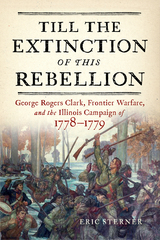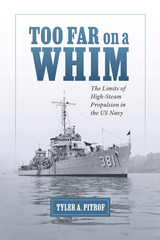258 start with E start with E

Evangelical Identity and Gendered Family Life provides a sociological and historical analysis of gender, family, and work among evangelical Protestants. In this innovative study, Sally Gallagher traces two lines of gender ideals—one of husbands’ authority and leadership, the other of mutuality and partnership in marriage—from the Puritans to the Promise Keepers into the lives of ordinary evangelicals today. Rather than simply reacting against or accommodating themselves to “secular society,” Gallagher argues that both traditional and egalitarian evangelicals draw on longstanding beliefs about gender, human nature, and the person of God.
The author bases her arguments on an analysis of evangelical family advice literature, data from a large national survey and personal interviews with over 300 evangelicals nationwide. No other work in this area draws on such a range of data and methodological resources. Evangelical Identity and Gendered Family Life establishes a standard for future research by locating the sources, strategies, and meaning of gender within evangelical Protestantism.
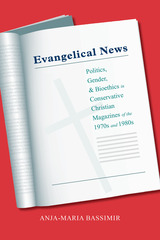
The 1970s and 1980s were a tumultuous period in US history. In tandem with a dramatic political shift to the right, evangelicalism also entered the public discourse as a distinct religious movement and was immediately besieged by cultural appropriations and internal fragmentations. Americans in general and evangelicals in particular grappled with issues and ideas such as feminism, abortion, birth control, and restructuring traditional roles for women and the family. During this time, there was a surge in readership for evangelical periodicals such as Christianity Today, Moody Monthly, Eternity, and Post-Americans/Sojourners as well as the feminist newsletter Daughters of Sarah.
While each of these magazines—and other publications and media—contributed to and participated in the overall dissemination of evangelical ideology, they also had their own outlooks and political leanings concerning hot-button issues. In Evangelical News: Politics, Gender, and Bioethics in Conservative Christian Magazines of the 1970s and 1980s, Anja-Maria Bassimir presents a nuanced view of evangelicalism in the late twentieth century through the lens of the movement’s own media.
Bassimir argues that community can be produced in discourse, especially when shared rhetoric, concepts, and perspectives signal belonging. To accomplish this, Evangelical News traces the emergence of evangelical social and political awareness in the 1970s to the height of its power as a political program. The chapters investigate such topics as how evangelicals reenvisioned gender norms and relations in light of the feminist movement, the use of childhood as a symbol of unspoiled innocence, and the place of evangelicals as political actors.
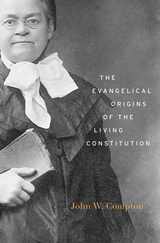
The New Deal is often said to represent a sea change in American constitutional history, overturning a century of precedent to permit an expanded federal government, increased regulation of the economy, and eroded property protections. John Compton offers a surprising revision of this familiar narrative, showing that nineteenth-century evangelical Protestants, not New Deal reformers, paved the way for the most important constitutional developments of the twentieth century.
Following the great religious revivals of the early 1800s, American evangelicals embarked on a crusade to eradicate immorality from national life by destroying the property that made it possible. Their cause represented a direct challenge to founding-era legal protections of sinful practices such as slavery, lottery gambling, and buying and selling liquor. Although evangelicals urged the judiciary to bend the rules of constitutional adjudication on behalf of moral reform, antebellum judges usually resisted their overtures. But after the Civil War, American jurists increasingly acquiesced in the destruction of property on moral grounds.
In the early twentieth century, Oliver Wendell Holmes and other critics of laissez-faire constitutionalism used the judiciary’s acceptance of evangelical moral values to demonstrate that conceptions of property rights and federalism were fluid, socially constructed, and subject to modification by democratic majorities. The result was a progressive constitutional regime—rooted in evangelical Protestantism—that would hold sway for the rest of the twentieth century.
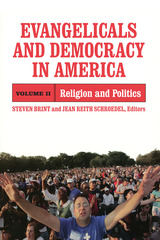
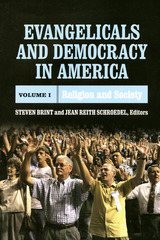
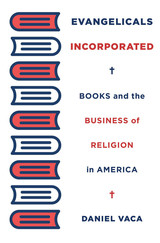
A new history explores the commercial heart of evangelical Christianity.
American evangelicalism is big business. For decades, the world’s largest media conglomerates have sought out evangelical consumers, and evangelical books have regularly become international best sellers. In the early 2000s, Rick Warren’s The Purpose Driven Life spent ninety weeks on the New York Times Best Sellers list and sold more than thirty million copies. But why have evangelicals achieved such remarkable commercial success?
According to Daniel Vaca, evangelicalism depends upon commercialism. Tracing the once-humble evangelical book industry’s emergence as a lucrative center of the US book trade, Vaca argues that evangelical Christianity became religiously and politically prominent through business activity. Through areas of commerce such as branding, retailing, marketing, and finance, for-profit media companies have capitalized on the expansive potential of evangelicalism for more than a century.
Rather than treat evangelicalism as a type of conservative Protestantism that market forces have commodified and corrupted, Vaca argues that evangelicalism is an expressly commercial religion. Although religious traditions seem to incorporate people who embrace distinct theological ideas and beliefs, Vaca shows, members of contemporary consumer society often participate in religious cultures by engaging commercial products and corporations. By examining the history of companies and corporate conglomerates that have produced and distributed best-selling religious books, bibles, and more, Vaca not only illustrates how evangelical ideas, identities, and alliances have developed through commercial activity but also reveals how the production of evangelical identity became a component of modern capitalism.
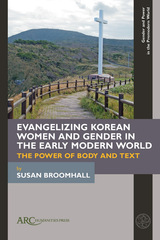

What might we learn if the study of ethics focused less on hard cases and more on the practices of everyday life? In Everyday Ethics, Michael Lamb and Brian Williams gather some of the world’s leading scholars and practitioners of moral theology (including some GUP authors) to explore that question in dialogue with anthropology and the social sciences. Inspired by the work of Michael Banner, these scholars cross disciplinary boundaries to analyze the ethics of ordinary practices—from eating, learning, and loving thy neighbor to borrowing and spending, using technology, and working in a flexible economy. Along the way, they consider the moral and methodological questions that emerge from this interdisciplinary dialogue and assess the implications for the future of moral theology.

As southern Lebanon becomes the latest battleground for Islamist warriors, Everyday Jihad plunges us into the sprawling, heavily populated Palestinian refugee camp at Ain al-Helweh, which in the early 1990s became a site for militant Sunni Islamists. A place of refuge for Arabs hunted down in their countries of origin and a recruitment ground for young disenfranchised Palestinians, the camp--where sheikhs began actively recruiting for jihad--situated itself in the global geography of radical Islam.
With pioneering fieldwork, Bernard Rougier documents how Sunni fundamentalists, combining a literal interpretation of sacred texts with a militant interpretation of jihad, took root in this Palestinian milieu. By staying very close to the religious actors, their discourse, perceptions, and means of persuasion, Rougier helps us to understand how radical religious allegiances overcome traditional nationalist sentiment and how jihadist networks grab hold in communities marked by unemployment, poverty, and despair.
With the emergence of Hezbollah, the Shiite political party and guerrilla army, at the forefront of Lebanese and regional politics, relations with the Palestinians will be decisive. The Palestinian camps of Lebanon, whose disarmament is called for by the international community, constitute a contentious arena for a multitude of players: Syria and Iran, Hezbollah and the Palestinian Authority, and Bin Laden and the late Zarqawi. Witnessing everyday jihad in their midst offers readers a rare glimpse into a microcosm of the religious, sectarian, and secular struggles for the political identity of the Middle East today.
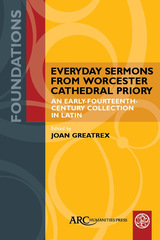

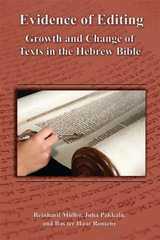
A new perspective on editorial activity in the Hebrew Bible for research and teaching
Evidence of Editing lays out the case for substantial and frequent editorial activity within the Hebrew Bible. The authors show how editors omitted, expanded, rewrote, and compiled both smaller and larger phrases and passages to address religious and political change. The book refines the exegetical method of literary and redaction criticism, and its results have important consequences for the future use of the Hebrew Bible in historical and theological studies.
Features:
- Hebrew, Greek, and Aramaic examples of editorial activity
- Clear explanations of the distinctions between textual, literary, and redaction criticism
- Fifteen chapters attesting to continual editorial activity in the Torah, the Prophets, and the Writings
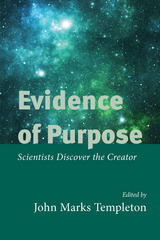

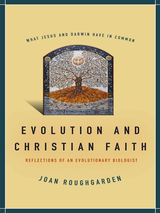
Perhaps only someone with Roughgarden's unique academic standing could examine so well controversial issues such as the teaching of intelligent design in public schools, or the potential flaws in Darwin's theory of evolution. Certainly Roughgarden is uniquely suited to reference both the minutiae of scientific processes and the implication of Biblical verses. Whether the topic is mutation rates and lizards or the hidden meanings behind St. Paul's letters, Evolution and Christian Faith distils complex arguments into everyday understanding. Roughgarden has scoured the Bible and scanned the natural world, finding examples time and again, not of conflict, but of harmony.
The result is an accessible and intelligent context for seeing a Christian vision of the world that embraces science. In the ongoing debates over creationism and evolution, Evolution and Christian Faith will be seen as a work of major significance, written for contemporary readers who wonder how-or if-they can embrace scientific advances while maintaining their traditional values.

"I'm an evolutionary biologist and a Christian," states Stanford professor Joan Roughgarden at the outset of her groundbreaking new book, Evolution and Christian Faith: Reflections of an Evolutionary Biologist. From that perspective, she offers an elegant, deeply satisfying reconciliation of the theory of evolution and the wisdom of the Bible.
Perhaps only someone with Roughgarden's unique academic standing could examine so well controversial issues such as the teaching of intelligent design in public schools, or the potential flaws in Darwin's theory of evolution. Certainly Roughgarden is uniquely suited to reference both the minutiae of scientific processes and the implication of Biblical verses. Whether the topic is mutation rates and lizards or the hidden meanings behind St. Paul's letters, Evolution and Christian Faith distils complex arguments into everyday understanding. Roughgarden has scoured the Bible and scanned the natural world, finding examples time and again, not of conflict, but of harmony.
The result is an accessible and intelligent context for a Christian vision of the world that embraces science. In the ongoing debates over creationism and evolution, Evolution and Christian Faith will be seen as a work of major significance, written for contemporary readers who wonder how-or if-they can embrace scientific advances while maintaining their traditional values.
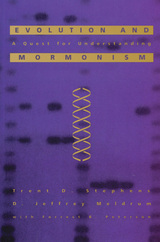
Their approach comes from a position of faith. They quote from the Creation account in the Pearl of Great Price: ”And the Gods said: Let us prepare the waters to bring forth abundantly the moving creatures that have life. And the Gods saw that they would be obeyed and that their plan was good.” In the authors’ view, the passage’s emphasis on process over end result is consistent with modern science.
According to the LDS church, “Whether the mortal bodies of man evolved in natural processes to present perfection” or were formed by some other means is “not fully answered in the revealed word of God.” That God may have created the mechanism by which all life was formed—rather than each organism separately—is a concept that the authors find to be a satisfying and awe-inspiring possibility.
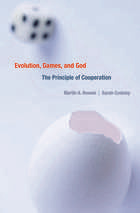
According to the reigning competition-driven model of evolution, selfish behaviors that maximize an organism’s reproductive potential offer a fitness advantage over self-sacrificing behaviors—rendering unselfish behavior for the sake of others a mystery that requires extra explanation. Evolution, Games, and God addresses this conundrum by exploring how cooperation, working alongside mutation and natural selection, plays a critical role in populations from microbes to human societies. Inheriting a tendency to cooperate, argue the contributors to this book, may be as beneficial as the self-preserving instincts usually thought to be decisive in evolutionary dynamics.
Assembling experts in mathematical biology, history of science, psychology, philosophy, and theology, Martin Nowak and Sarah Coakley take an interdisciplinary approach to the terms “cooperation” and “altruism.” Using game theory, the authors elucidate mechanisms by which cooperation—a form of working together in which one individual benefits at the cost of another—arises through natural selection. They then examine altruism—cooperation which includes the sometimes conscious choice to act sacrificially for the collective good—as a key concept in scientific attempts to explain the origins of morality. Discoveries in cooperation go beyond the spread of genes in a population to include the spread of cultural transformations such as languages, ethics, and religious systems of meaning.
The authors resist the presumption that theology and evolutionary theory are inevitably at odds. Rather, in rationally presenting a number of theological interpretations of the phenomena of cooperation and altruism, they find evolutionary explanation and theology to be strongly compatible.

In this book, Stephen J. Pope argues that contemporary scientifically-based theories of the evolution of altruism provide important insights into one of the fundamental moral problems of Christian ethics, the natural basis of love and its ordering. He explores the contributions evolutionary theory makes to our understanding of the biological foundations of kin preference and reciprocal care, the limits of love, and the need for an ordering of love—issues relevant to any ethic that accords a central role to the deeply natural affections found in friendship, marriage, and the family. He proposes that understanding human nature in its broader evolutionary context brings to ethics a needed balance between the personal and biological dimensions of human nature.
In the context of Catholic ethics, Pope points out functional similarities between Thomas Aquinas's use of then-available scientific theories in his interpretation of the natural basis of primary relationships and Pope's own efforts to avoid the deficiencies that characterize contemporary Catholic interpretations of love based on personalism and existentialism. He concludes with a call for a multidimensional interpretation of love, one that incorporates scientifically-based theories about human nature together with an appreciation of the significance of motives, intentions, and freedom, for the ordering of human affections and moral responsibility. This book will be of interest to moral theologians, especially those concerned with the topics of love, justice, and natural law ethics.
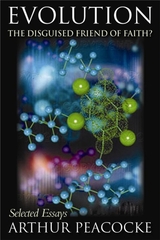
Arthur Peacocke, eminent priest-scientist, has collected thirteen of his essays for this volume. Previously published in various academic journals and edited books, the provocative essays expand upon the theme of the evolution of nature, humanity, and belief. They are grouped into three parts:
- Natural Evolution covers topics ranging from the implications of deterministic chaos; biological evolution and Christian theology; chance, potentiality, and God; complexity, emergence, and divine creativity.
- Humanity Evolving in the Presence of God, articulating God’s presence in and to the world as it is unveiled by the sciences; the chrysalis of the human; the nature and purpose of man in science and Christian theology.
- Theological Evolution—the Reshaping of Belief, dealing with science and the future of theology; public truth in religion; the incarnation of the self-expressive word of God; DNA; and the challenges and possibilities of western theism.
In the epilogue, Dr. Peacocke discusses wisdom in science and education, referring to Robert Grosseteste, a medieval scientist-theologian.
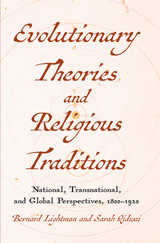
How Intellectuals and Global Publics Viewed the Relationship between Evolution and Diverse Religious Traditions
Before the advent of radio, conceptions of the relationship between science and religion circulated through periodicals, journals, and books, influencing the worldviews of intellectuals and a wider public. In this volume, historians of science and religion examine that relationship through diverse mediums, geographic contexts, and religious traditions. Spanning within and beyond Europe and North America, chapters emphasize underexamined regions—New Zealand, Australia, India, Argentina, Sri Lanka, Egypt, and the Ottoman Empire—and major religions of the world, including Christianity, Hinduism, Buddhism, Confucianism, and Islam; interactions between those traditions; as well as atheism, monism, and agnosticism. As they focus on evolution and human origins, contributors draw attention to European scientists other than Darwin who played a significant role in the dissemination of evolutionary ideas; for some, those ideas provided the key to understanding every aspect of human culture, including religion. They also highlight central figures in national contexts, many of whom were not scientists, who appropriated scientific theories for their own purposes. Taking a local, national, transnational, and global approach to the study of science and religion, this volume begins to capture the complexity of cultural engagement with evolution and religion in the long nineteenth century.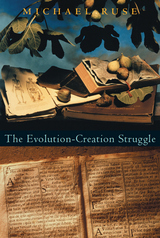
Creation versus evolution: What seems like a cultural crisis of our day, played out in courtrooms and classrooms across the county, is in fact part of a larger story reaching back through the centuries. The views of both evolutionists and creationists originated as inventions of the Enlightenment--two opposed but closely related responses to a loss of religious faith in the Western world.
In his latest book, Michael Ruse, a preeminent authority on Darwinian evolutionary thought and a leading participant in the ongoing debate, uncovers surprising similarities between evolutionist and creationist thinking. Exploring the underlying philosophical commitments of evolutionists, he reveals that those most hostile to religion are just as evangelical as their fundamentalist opponents. But more crucially, and reaching beyond the biblical issues at stake, he demonstrates that these two diametrically opposed ideologies have, since the Enlightenment, engaged in a struggle for the privilege of defining human origins, moral values, and the nature of reality.
Highlighting modern-day partisans as divergent as Richard Dawkins and Left Behind authors Tim LaHaye and Jerry B. Jenkins, Ruse's bracing book takes on the assumptions of controversialists of every stripe and belief and offers to all a new and productive way of understanding this unifying, if often bitter, quest.
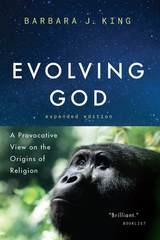
Religion has been a central part of human experience since at least the dawn of recorded history. The gods change, as do the rituals, but the underlying desire remains—a desire to belong to something larger, greater, most lasting than our mortal, finite selves.
But where did that desire come from? Can we explain its emergence through evolution? Yes, says biological anthropologist Barbara J. King—and doing so not only helps us to understand the religious imagination, but also reveals fascinating links to the lives and minds of our primate cousins. Evolving God draws on King’s own fieldwork among primates in Africa and paleoanthropology of our extinct ancestors to offer a new way of thinking about the origins of religion, one that situates it in a deep need for emotional connection with others, a need we share with apes and monkeys. Though her thesis is provocative, and she’s not above thoughtful speculation, King’s argument is strongly rooted in close observation and analysis. She traces an evolutionary path that connects us to other primates, who, like us, display empathy, make meanings through interaction, create social rules, and display imagination—the basic building blocks of the religious imagination. With fresh insights, she responds to recent suggestions that chimpanzees are spiritual—or even religious—beings, and that our ancient humanlike cousins carefully disposed of their dead well before the time of Neandertals.
King writes with a scientist’s appreciation for evidence and argument, leavened with a deep empathy and admiration for the powerful desire to belong, a desire that not only brings us together with other humans, but with our closest animal relations as well.
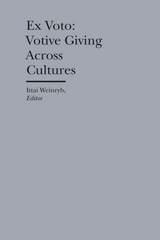
The contributors to this comparative study examine ex votos across a range of locations and time periods, including the classical Mediterranean world, medieval Europe, the period of the Catholic Reform, and on to Mexico, Shinto and Buddhist Japan, and Muslim Iran. Voluminous and diverse, Ex Voto will appeal in a wide range of fields, including history, religion, and anthropology.
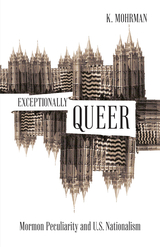
How perceptions of Mormonism from 1830 to the present reveal the exclusionary, racialized practices of the U.S. nation-state
Are Mormons really so weird? Are they potentially queer? These questions occupy the heart of this powerful rethinking of Mormonism and its place in U.S. history, culture, and politics. K. Mohrman argues that Mormon peculiarity is not inherent to the Latter-day Saint faith tradition, as is often assumed, but rather a potent expression of U.S. exceptionalism.
Exceptionally Queer scrutinizes the history of Mormonism starting with its inception in the early 1830s and continuing to the present. Drawing on a wide range of historical texts and moments—from nineteenth-century battles over Mormon plural marriage; to the LDS Church’s emphases on “individual responsibility” and “family values”; to mainstream media’s coverage of the LDS Church’s racist exclusion of Black priesthood holders, its Native assimilation programs, and vehement opposition to the Equal Rights Amendment; and to much more recent legal and cultural battles over same-sex marriage and on-screen Mormon polygamy—Exceptionally Queer evaluates how Mormonism has been used to motivate and rationalize the biased, exclusionary, and colonialist policies and practices of the U.S. nation-state.
Mohrman explains that debates over Mormonism both drew on and shaped racial discourses and, in so doing, delineated the boundaries of whiteness and national belonging, largely through the consolidation of (hetero)normative ideas of sex, marriage, family, and economy. Ultimately, the author shows how discussions of Mormonism in this country have been and continue to be central to ideas of what it means to be American.
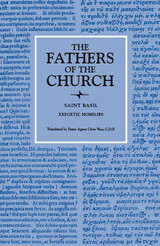
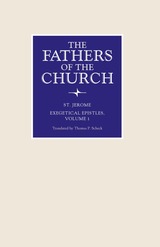

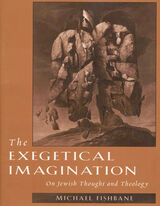
Exegesis--interpretation and explanation of sacred texts--is the quintessence of rabbinic thought. Through such means and methods, the written words of Hebrew Scripture have been extended since antiquity, and given new voices for new times. In this lucid and often poetic book, Michael Fishbane delineates the connections between biblical interpretation and Jewish religious thought.
How can a canon be open to new meanings, given that it is believed to be immutable? Fishbane discusses the nature and rationale of this interpretative process in a series of studies on ancient Jewish speculative theology. Focusing on questions often pondered in Midrash, he shows how religious ideas are generated or justified by exegesis. He also explores the role exegesis plays in liturgy and ritual. A striking example is the transfer of speculative interpretations into meditation in prayer. Cultivation of the ability to perceive many implicit meanings in a text or religious practice can become a way of living--as Fishbane shows in explaining how such notions as joy or spiritual meditations on death can be idealized and the ideal transmitted through theological interpretation. The Exegetical Imagination is a collection of interrelated essays that together offer new and profound understanding of scriptural interpretation and its central role in Judaism.

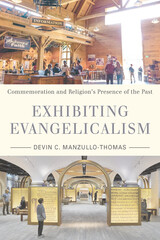
Religion is a subject often overlooked or ignored by public historians. Whether they are worried about inadvertent proselytizing or fearful of contributing to America’s ongoing culture wars, many heritage professionals steer clear of discussing religion’s formative role in the past when they build collections, mount exhibits, and develop educational programming. Yet religious communities have long been active contributors to the nation’s commemorative landscape.
Exhibiting Evangelicalism provides the first account of the growth and development of historical museums created by white evangelical Christians in the United States over the twentieth and twenty-first centuries. Exploring the histories of the Museum of the Bible, the Billy Graham Center Museum, the Billy Sunday Home, and Park Street Church, Devin C. Manzullo-Thomas illustrates how these sites enabled religious leaders to develop a coherent identity for their fractious religious movement and to claim the centrality of evangelicalism to American history. In their zeal to craft a particular vision of the national past, evangelicals engaged with a variety of public history practices and techniques that made them major players in the field—including becoming early adopters of public history’s experiential turn.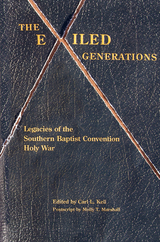
Until now, the stories of this “lost generation” have never been fully told. In this collection, Professor Kell presents a diverse and wide range of voices. Some are well-known Baptist leaders, while others are ordinary people caught up in the remarkable changes in Baptist life over the past few decades. Here, they recount their feelings of loss as they were severed from youth fellowships and removed from church rolls. Many describe the lingering emotional effects of the heartbreaking conflict that dominated their childhood and adolescence. Their recollections reveal the full range of responses—anger, sadness, pathos, humor, intense inner reflection—to these enormous shifts. This volume shows the extent to which this group has struggled and wandered in emotional and religious exile.
The Exiled Generations comprises rich primary sources for scholars and students who are exploring the profound strife that has rocked the Southern Baptist Convention. These deeply moving accounts will offer invaluable assistance to researchers analyzing the impact of the seismic changes within the denomination over the past thirty-five years.
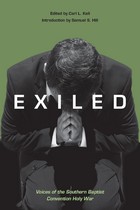
tactics to gain top positions and then used their power to purge Baptist seminary presidents and professors, church pastors, lay leaders, and women from positions of responsibility. America's largest Christian, non-Catholic denomination is firmly locked in a “holy war” to secure its churches and membership for a never-ending struggle against a liberal culture.
Exiled: Voices of the Southern Baptist Convention Holy War is a compilation of first-person narratives by conservative and moderate ministers and lay leaders who were stripped of their positions and essentially became pariahs in the churches to which they had devoted their lives.
While other books have described the takeover in historical, political, and theological terms, Exiled is different. Individual people tell their personal stories, revealing the struggle and heartache that resulted from being vilified, dispossessed, and exiled. Kell includes a variety of perspectives-from lay preachers and church members to prominent former SBC leaders such as James Dunn and Carolyn Crumpler.
The emotion captured on the pages-sadness, shock, disbelief, resignation,
and anger-will make Exiled moving even to readers who know little about the Southern Baptist movement. Exiled will also be of particular interest to historians, sociologists, philosophers of religion, and rhetorical historians.
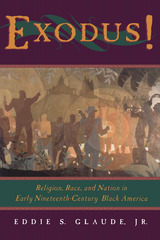
Exodus! shows how this biblical story inspired a pragmatic tradition of racial advocacy among African Americans in the early nineteenth century—a tradition based not on race but on a moral politics of respectability. Eddie S. Glaude, Jr., begins by comparing the historical uses of Exodus by black and white Americans and the concepts of "nation" it generated. He then traces the roles that Exodus played in the National Negro Convention movement, from its first meeting in 1830 to 1843, when the convention decided—by one vote—against supporting Henry Highland Garnet's call for slave insurrection.
Exodus! reveals the deep historical roots of debates over African-American national identity that continue to rage today. It will engage anyone interested in the story of black nationalism and the promise of African-American religious culture.

How has our understanding of our world and our place in the universe changed in recent decades through the momentous discoveries of science? Do recent developments in the philosophy of science, which place limitations on scientific knowing, provide a more level playing field? This collection of essays and sermons, which have not been readily available before, address these thought-provoking questions.
The John Templeton Foundation sponsored an essay and sermon contest to convey an expanded vision of God, one that is informed by recent discoveries of science on the nature of the universe and the place we have in the world. These selections are the winners of that competition.
The book is divided into three sections: “Contemporary Science Raising Theological Questions,” “New Visions of Theology,” and “Historical and Philosophical Perspectives on the Science-Religion Dialogue.” The essays cover such areas as physics, theology, cosmology, origins, and artificial intelligence.
“There is another way to conceive our life together. There is another way to conceive of our life in God, but it requires a different worldview—not a clockwork universe in which individuals function as discrete springs and gears, but one that looks more like a luminous web, in which the whole is far more than the parts. In this universe, there is no such thing as an individual apart from his or her relationships. Every interaction—between people and people, between people and things, between things and things—changes the face of history. Life on earth cannot be reduced to four sure-fire rules. It is an ever-unfolding mystery that defies precise prediction. Meanwhile, in this universe, there is no such thing as 'parts‚' The whole is the fundamental unit of reality.” —Barbara Brown Taylor, “Physics and Faith,”
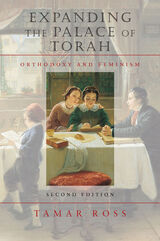
This new edition brings this acclaimed and classic text back into print with a new essay by Tamar Ross which examines new developments in feminist thought since the book was first published in 2004.
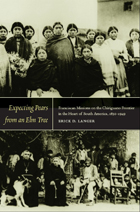
Expecting Pears from an Elm Tree is based on twenty years of research, including visits to the sites of nearly every mission discussed and interviews with descendants of mission Indians, Indian chiefs, Franciscan friars, mestizo settlers, and teachers. Langer chronicles how, beginning in the 1840s, the establishment of missions fundamentally changed the relationship between the Chiriguano villages and national society. He looks at the Franciscan missionaries’ motives, their visions of ideal missions, and the realities they faced. He also examines mission life from the Chiriguano point of view, considering their reasons for joining missions and their resistance to conversion, as well as the interrelated issues of Indian acculturation and the development of the mission economy, particularly in light of the relatively high rates of Indian mortality and outmigration. Expanding his focus, Langer delves into the complex interplay of Indians, missionaries, frontier society, and the national government until the last remaining missions were secularized in 1949. He concludes with a comparative analysis between colonial and republican-era missions throughout Latin America.
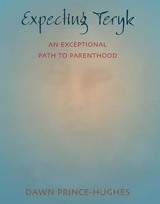
“Expecting Teryk is a rich and sumptuous work that speaks to the deeper realities and represents a unique viewpoint of experiences shared by all individuals who choose the path to parenthood.”—Disability, Pregnancy, and Parenthood
The period just prior to the birth of a child is a time of profound personal transformation for expectant parents. Expecting Teryk: An Exceptional Path to Parenthood is an intimate exploration, written in the form of a letter from a parent to her future son, that reclaims a rite of passage that modern society would strip of its magic.
Dawn Prince-Hughes, renowned author of Songs of the Gorilla Nation: My Journey through Autism, considers the ways being autistic might inform her parenting. She also candidly narrates her experience of becoming a parent as part of a lesbian couple—from meeting her partner to the questions they ask about their readiness to become parents and the practical considerations of choosing a sperm donor.
Expecting Teryk is viewed through the lens of autism as Prince-Hughes shares the unique way she sees and experiences the world—as well as her aching will to be fully present for her son. Contemplating the evolutionary traditions of parenting from both animal and human perspectives and the reassurances that nature offers, Expecting Teryk is a work of sensuous wonder that speaks to the deeper realities and archetypal experiences shared by all who embark on the journey of parenthood.
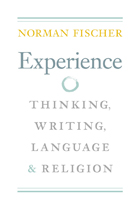
Raised in a Conservative Jewish family, Fischer embraced the twin practices of Zen Buddhism and innovative poetics in San Francisco in the early 1970s. His work includes original poetry, descriptions of Buddhist practice, translations of the Hebrew psalms, and eclectic writings on a range of topics from Homer to Heidegger to Kabbalah. Both Buddhist priest and participant in avant-garde poetry’s Language movement, Fischer has limned the fertile affinities and creative contradictions between Zen and writing, accumulating four decades of rich insights he shares in Experience.
Fischer’s work has been deeply enriched through his collaborations with leading rabbis, poets, artists, esteemed Zen Buddhist practitioners, Trappist monks, and renowned Buddhist leaders, among them the Dalai Lama. Alone and with others, he has carried on a deep and sustained investigation into the intersection of writing and consciousness as informed by meditation.
The essays in this artfully curated collection range across divers, fascinating topics such as time, the Heart Sutra, God in the Hebrew psalms, the supreme “uselessness” of art making, “late work” as a category of poetic appreciation, and the subtle and dubious notion of “religious experience.” From the theoretical to the revealingly personal, Fischer’s essays, interviews, and notes point toward a dramatic expansion of the sense of religious feeling in writing.
Readers who join Fischer on this path in Experience can discover how language is not a description of experience, but rather an experience itself: shifting, indefinite, and essential.

Place and orientation are important aspects of human experience. Place evokes geography and culture and conjures up history and myth. Place is not only a particular physical location but an idea, a mental construction that captures and directs the human relationship to the world.
The distinguished contributors to this volume invite us to reflect on the significance of places, real and imagined, in the religious traditions they study and on how places are known, imagined, remembered, and struggled for. Whether looking at the ways myth and ritual reinforce the Yoruba's bond to the land or at Australian Aboriginal engagements with the origins of the created world, exploring Hildegard of Bingen's experience of heaven or myths of the underworld in contemporary American millennialism, listening to oral narratives of divine politics and deserted places of Rajasthan or investigating literal and literary images of the Promised Land, these essays underscore that place is constructed in the intersection of material conditions, political realities, narrative, and ritual performance.
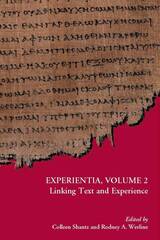
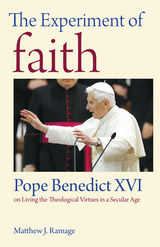
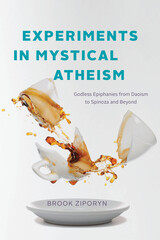
Western philosophy is stuck in an irresolvable conflict between two approaches to the spiritual malaise of our times: either we need more God (the “turn to religion”) or less religion (the New Atheism). In this book, Brook Ziporyn proposes an alternative that avoids both totalizing theomania and meaningless empiricism. What we need, he argues, is a deeper, more thoroughgoing, even religious rejection of God: an affirmative atheism without either a Creator to provide meaning or finite creatures in need of it—a mystical atheism.
In the legacies of Daoism and Buddhism as well as Spinoza, Nietzsche, and Bataille, Ziporyn discovers a critique of theism that develops into a new, positive sensibility—at once deeply atheist and richly religious. Experiments in Mystical Atheism argues that these “godless epiphanies” hold the key to renewing philosophy today.
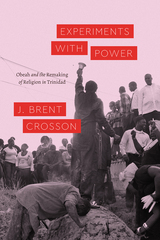
From eighteenth-century slave rebellions to contemporary responses to police brutality, Caribbean methods of problem-solving “spiritual work” have been criminalized under the label of “obeah.” Connected to a justice-making force, obeah remains a crime in many parts of the anglophone Caribbean. In Experiments with Power, J. Brent Crosson addresses the complex question of what obeah is. Redescribing obeah as “science” and “experiments,” Caribbean spiritual workers unsettle the moral and racial foundations of Western categories of religion. Based on more than a decade of conversations with spiritual workers during and after the state of emergency, this book shows how the reframing of religious practice as an experiment with power transforms conceptions of religion and law in modern nation-states.

Now in paperback!
Cognitive science of religion is a radically new paradigm in the study of religion. Historians of religion have shown increasing interest in this approach. The book is in four parts: an introduction to cognitive and social-scientific approaches, applications of cognitive science, applications of conceptual blending theory, and applications of socio-cognitive analyses.
Features:
- Paperback format of an essential Brill resource
- Essays that combine cognitive analysis with historical and social-scientific approaches to biblical materials, Christian origins, and early Judaism
- Research for historians of religion, biblical scholars, and those working in the cognitive science of religion.
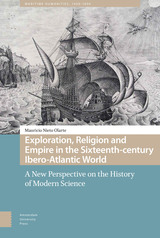
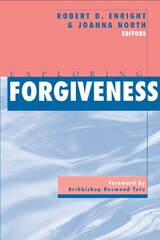
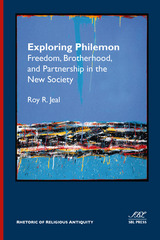
A new, sociorhetorical interpretation of the Letter to Philemon
Exploring Philemon shows how this letter entered the world of the ancient Mediterranean and the early church with a dramatic and powerful rhetorical force by analyzing the range of textures interwoven with each other to produce a profound effect on an early Christian (Philemon) and on the church that met in his home. It demonstrates that many striking and subtle features work together to present a rhetorical argument that the new Christian society must be one of freedom, brotherhood, and partnership not just for the powerful, but for all.
Features:
- An analysis of the visual imagery of the letter
- Application of up-to-date rhetorical, sensory-aesthetic, and intertextual interpretive methods
- Use of Social and cultural, ideological, and theological strategies
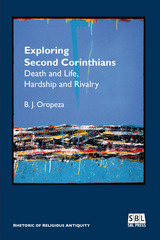
A multi-faceted commentary that breathes fresh insight into Paul's letter
In Second Corinthians, Paul responds to reports of the Corinthian congregation questioning his competency as a divinely sent messenger. Through apologetic demegoria and the use of graphic imagery related to triumphal processions, siege warfare, and emissary travels and negotiation, Paul defends his constancy, persona, and speaking abilities as he extends the offer of clemency and reconciliation to his auditors. Oropeza combines rhetorical pictures (rhetography) with interpretative layers (literary features, intertextuality, socio-cultural, ideological, and sacred textures) to arrive at the rhetorical impact of Paul's message for ancient Mediterranean discourse.
Features:- A visual, sensory, and imaginative interpretation of the scripture
- A comprehensive commentary
- An avant-garde approach to biblical interpretation

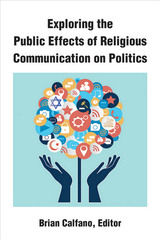
Though not all people are religious believers, religion has played important historic roles in developing political systems, parties, and policies—affecting believers and nonbelievers alike. This is particularly true in the United States, where scholars have devoted considerable attention to a variety of political phenomena at the intersection of religious belief and identity, including social movements, voting behavior, public opinion, and public policy. These outcomes are motivated by “identity boundary-making” among the religiously affiliated. The contributors to this volume examine two main factors that influence religious identity: the communication of religious ideas and the perceptions of people (including elites) in communicating said ideas.
Exploring the Public Effects of Religious Communication on Politics examines an array of religious communication phenomena. These include the media’s role in furthering religious narratives about minority groups, religious strategies that interest groups use to advance their appeal, the variable strength of Islamophobia in cross-national contexts, what qualifies as an “evangelical” identity, and clergy representation of religious and institutional teachings. The volume also provides ways for readers to think about developing new insights into the influence religious communication has on political outcomes.
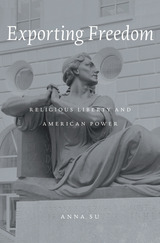
Religious freedom is widely recognized today as a basic human right, guaranteed by nearly all national constitutions. Exporting Freedom charts the rise of religious freedom as an ideal firmly enshrined in international law and shows how America’s promotion of the cause of individuals worldwide to freely practice their faith advanced its ascent as a global power.
Anna Su traces America’s exportation of religious freedom in various laws and policies enacted over the course of the twentieth century, in diverse locations and under a variety of historical circumstances. Influenced by growing religious tolerance at home and inspired by a belief in the United States’ obligation to protect the persecuted beyond its borders, American officials drafted constitutions as part of military occupations—in the Philippines after the Spanish-American War, in Japan following World War II, and in Iraq after 2003. They also spearheaded efforts to reform the international legal order by pursuing Wilsonian principles in the League of Nations, drafting the United Nations Charter, and signing the Helsinki Accords during the Cold War. The fruits of these labors are evident in the religious freedom provisions in international legal instruments, regional human rights conventions, and national constitutions.
In examining the evolution of religious freedom from an expression of the civilizing impulse to the democratization of states and, finally, through the promotion of human rights, Su offers a new understanding of the significance of religion in international relations.
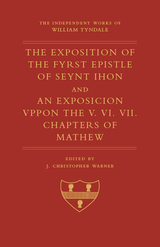
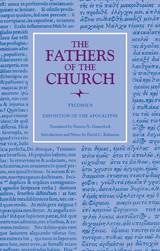
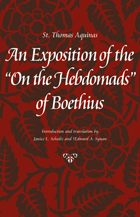
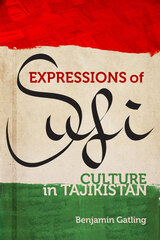
Gatling demonstrates how Sufis transcend the oppressive religious politics of contemporary Tajikistan by using these forms to inhabit multiple times: the paradoxical present, the Persian sacred past, and the Soviet era. In a world consumed with the supposed political dangers of Islam, Gatling shows the intricate, ground-level ways that Muslim expressive culture intersects with authoritarian politics, not as artful forms of resistance but rather as a means to shape Sufi experiences of the present.
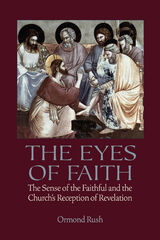
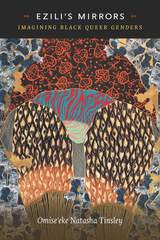
READERS
Browse our collection.
PUBLISHERS
See BiblioVault's publisher services.
STUDENT SERVICES
Files for college accessibility offices.
UChicago Accessibility Resources
home | accessibility | search | about | contact us
BiblioVault ® 2001 - 2024
The University of Chicago Press


